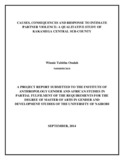| dc.description.abstract | Intimate partner violence is a significant medical, public health and societal concern worldwide. The study aimed at exploring community knowledge and attitudes on the causes and consequences of intimate partner violence, within the urban setting of Kakamega Central Sub-County in Kakamega County. An exploratory, qualitative study design was employed using focus group discussions and key informant interviews involving both men and women, was conducted in an urban community setting of Kakamega Central sub-county in Kakamega County. The data was then analyzed thematically along the study objectives and in line with the ecological framework.
The results indicate that some people are already fed up with intimate partner violence and are hence “questioning and challenging traditional gender norms”. This is resulting from the negative effects of the consequences of IPV which are overwhelming and unacceptable. The sad experiences had started fueling the desire for transition and change. At the individual and relationship levels, the related risk factors of IPV are exhibited under the category “fed up with silence”, where the community members are now seeking to speak out and seek audience to question, interrogate and challenge the gender norms that normalize violence. At the community and societal levels, the category “considered as part of male prestige” shows how masculinity prevails to perpetuate violence in the community. Power and control over resources and decision making is also exhibited in this category, where the community has placed more power in the hands of men thus creating dependency on the women‟s side. The measures suggested by the community members to stop or reduce IPV were targeting all the four levels – individual, family, community and the society at large.
The majority of factors associated with intimate partner violence are related to the male partner. The prevailing gender norms in Kakamega central sub-county still accept women‟s subordination and justify the violence meted on them, thus making women remain at a continued risk of experiencing violence. The existing cultural response mechanisms are also not effectively utilized as most of them are male managed and dominated, leaving women survivors with limited alternatives. Long term violence prevention interventions should therefore, target men, and specifically young boys growing up in families where domestic violence is prevalent. | en_US |

